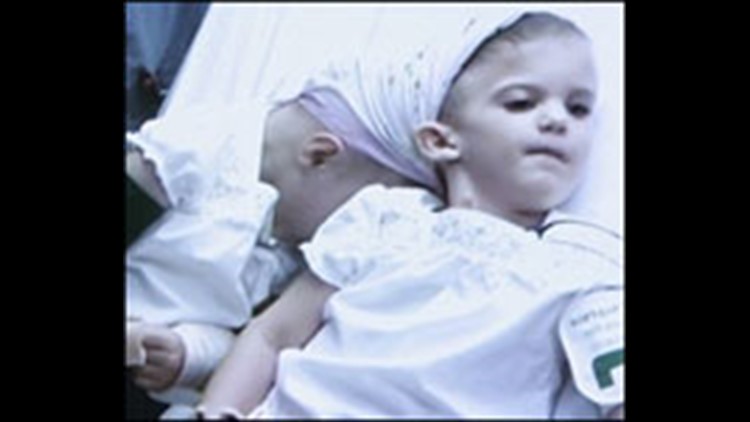Cleveland - Doctors who had hoped to separate twin 3-year-old girls joined at the head called off the long-planned surgery permanently, saying the risk to the children was too great, the hospital announced Monday.
The parents of Tatiana and Anastasia Dogaru had viewed separation surgery at Rainbow Babies & Children's Hospital as the girls' best hope, but the decision to cancel complied with their wish to avoid any procedure that could harm either girl.
The decision was announced by Dr. Nathan Levitan, chief medical officer of the hospital's parent, University Hospitals Case Medical Center.
The top of Tatiana's head is attached to the back of Anastasia's and they have never been able to look each other in the eye. Anastasia, the bigger twin, has no kidney function and relies on Tatiana's kidneys.
Even though few twins similarly conjoined have survived past childhood, doctors decided last week, after reviewing weeks of tests conducted on the girls, that "the risk of proceeding with separation is too great," Levitan said.
Risks of the surgery include infection and heart failure. "These types of problems are very hard to manage," Levitan said.
The girls were born in Italy to Romanian parents. Alin Dogaru, a Byzantine Catholic priest, and his wife, Claudia, said in a videotaped statement played at hospital news conference Monday that they were thankful for the care the girls had received.
Alin Dogaru said the family appreciated the hospital's consideration of their concern that neither girl face a significant risk.
"We want to thank them, the medical team, for being aware of this and stopping at the right time," he said.
Twins born joined at the head - known as craniopagus twins - occur in about one in 2.5 million births.
The blonde girls have already beaten the odds by living this long. Most twins joined at the head die at birth and just 10 percent survive to age 10, according to the hospital.
Levitan, asked about the girls' survival prospects, said only 14 similar twins have been reported in the past half century, and just 10 percent had reached age 11.
While medicine continues to make progress, "no one can predict the future," Levitan said.
Dr. James Tait Goodrich of New York's Montefiore Medical Center, who separated conjoined twins in 2004, said the complexity of the Dogaru case made the decision understandable.
"There are a lot of extenuating circumstances here that could have seriously led to the demise of both children or even if they had survived, been in a much more compromised state than they are in now at present," said Goodrich, who has consulted on the Dogaru case.
The girls arrived in Cleveland on April 3 from Dallas, where they had been evaluated, to begin testing to determine whether they could undergo separation surgery. Initial surgery to begin separating the twins on June 6 was halted because of brain swelling and low blood pressure.
They are doing well at home, walking and playing, Levitan said. But medical tests since the aborted surgery showed the hearts of both girls are overworking - Tatiana's as if to overcome a blockage and Anastasia's to deal with low blood pressure.
Levitan said the doctors involved in the case felt they had done the best they could to give the girls a chance to be separated.
"I expect we will all keep in touch with them," he said.
The hospital is working with the family to decide whether the girls will return to Romania or stay in the U.S., who will provide medical care and who will pay for it.
(Copyright 2007 Associated Press. All rights reserved. This material may not be published, broadcast, rewritten, or redistributed.)



